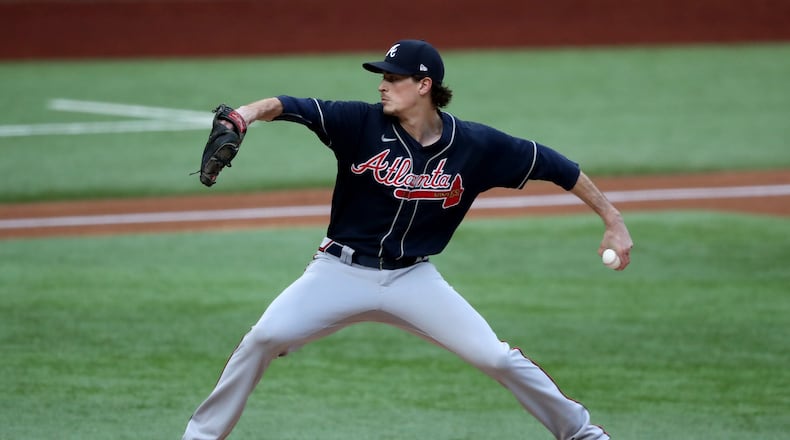A few hours before Game 6 of the National League Championship Series, Tyler Matzek summed up the Braves' confidence in their starting pitcher, Max Fried.
“The man has been lights-out all year,” said Matzek, a key member of the Braves' bullpen. “I expect him to continue doing what he has been doing.”
Among the things Fried had been doing all season was keeping the ball in the park. He allowed only two home runs in the 56 innings he pitched during the regular season.
So it was an unexpected early blow to the Braves' hopes of ending the NLCS on Saturday when the Los Angeles Dodgers hit two home runs off Fried in the first inning.
“I come out in a game like this and put us behind the 8-ball real quick,” Fried said afterward. “To me, that’s unacceptable. For me, I needed to be better.”
A towering fly ball on a hanging curveball to the Dodgers' second batter of the game, Corey Seager, landed beyond the right-field wall. Two pitches later, Justin Turner turned a two-seam fastball into a 418-foot homer to center.
“You leave a letter-high curveball to Seager, and he’s going to do what he did to it,” Fried said. “And a fastball right down the middle to Turner, same thing. I felt like I was searching for it, rather than just going after guys.”
After Turner’s homer, Fried walked the next batter, Max Muncy, and surrendered a single to Will Smith, putting runners on first and third bases with one out. A single by Cody Bellinger scored Muncy to give the Dodgers a 3-0 lead. The Braves had a reliever, Jacob Webb, warming up in the bullpen.
Fried fought back and impressively wound up pitching into the seventh inning, holding the Dodgers scoreless after the first. But the three first-inning runs were the difference as the Dodgers won the game 3-1 to even the best-of-seven series 3-3 and set up Game 7 on Sunday night.
Fried pitched 6-2/3 innings, allowed eight hits, walked four, struck out five and kept the Braves from having to over-tax their bullpen on the eve of Game 7.
But he took little solace from any of that.
“Obviously, that first inning was enough,” he said.
While Fried isn’t typically susceptible to home runs, the opening-inning difficulty wasn’t altogether uncharacteristic. He had a 4.91 ERA in the first inning during the regular season and a 1.60 ERA after the first.
The difference between his first inning and his next 5-2/3 innings Saturday, Fried said, was “as simple as execution.”
“I wasn’t able to get on top of any kind of pitch (in the first),” he said. “I felt like I was missing over the plate. ... I was just trying to limit damage as much as I could.”
While the Braves' hitters couldn’t overcome the damage of the 3-0 deficit, Fried kept his team within striking range into the late innings. No one would have guessed in the first inning that he would pitch deeper into the game than the Dodgers' starter, Walker Buehler.
Fried pitched around base runners in every inning from the second through the seventh. Mookie Betts singled with one out in the second, but was stranded at first base. Muncy had a leadoff single in the third, but didn’t advance. The Dodgers had runners on first and second with one out in the fourth, but didn’t score. A two-out walk in the fifth led to nothing. A one-out single in the sixth was erased with a double play. A one-out walk to Turner in the seventh was stranded, with Darren O’Day getting the final out of that inning after Fried reached a career-high 109 pitches.
Losing a Fried start is unfamiliar to the Braves. Entering Saturday, they were 13-1 this season in games started by the 26-year-old left-hander (10-1 in the regular season and 3-0 in the postseason).
Fried hadn’t allowed a home run all season – and had a 68-1/3-inning homer-less streak dating to last season – until a Sept. 23 game against the Miami Marlins. He allowed back-to-back homers in the first inning of that game, the only homers hit against him in the regular season, but there was an extenuating circumstance: Those were hit by the next two batters after Fried injured his left ankle fielding a bunt.
About the Author


